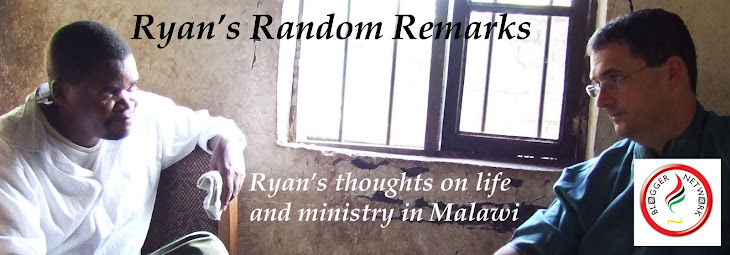The Lausanne gathering has six full days of programs. Yesterday, the day marking the half point of the meetings, was a day off. I think it probably served a couple of purposes. It allowed everyone some time off to reflect and not be required to absorb more information. It also gave an opportunity to those itching to see the sites of Cape Town time to tour some. I set off early for Table Mountain. In Ryan’s world, any visit to Cape Town requires a climbing of the mountain. I found a path that required rock climbing (!), arriving on top to a very foggy view of nothing (but fog). I arrived back in time to head to a service for the installing of the new Director for SIM South Africa. Siegfried Ngubane, a lecturer from George Whitfield College and pastor of a township church is the new Director. I was encouraged during his speech when he spoke of the need for the township churches to obey the great commission and send out missionaries. He said that “although we have a painful history and don’t see ourselves as having much, we need to send missionaries.”
Day 4 is focused on the Will of Christ and Priorities. In the first morning session, Vaughan Roberts of the UK considered the unity that Paul talks about in Ephesians 4. He reflected on the fact that even though globalization and the internet are bringing a kind of global unity, we are divided as ever. Non-Christians should be attracted by our unity, they are often repelled by our disunity. Our unity does not mean we should have uniformity. There is diversity in the body. We need to make sure that in our eagerness for unity we don’t sacrifice our theology. Some attempts to unify the church in the past have tended toward the lowest common theological denominator and ended up sacrificing key essential issues.
The second session was led by Paul Eshleman. The focus was on unreached peoples. There are about 16,000 people groups in the world. 3,700 still have no one working among them. Testimonies were given by some different participants that spoke about newer methods for reaching groups. Storytelling and engaging in dialogues with Muslim intellectuals were two methods highlighted. Time was then spent in table groups with a list of the unreached groups in the world. Participants were asked to commit to engaging with one or more of the groups. With a representation of leaders from almost every country in the world, it is possible to get a lot of legitimate commitments. We were asked to discuss the question of why there are still unreached peoples in the world. My table came up with two basic ideas the first is a lack of knowledge (we don’t know there are unreached people in our area of influence) and the second that we tend to want to work where we are more successful.
Coming to the Congress, there is a highly planned program. The themes are chosen ahead of time and a lot of discussions went on in different meetings leading up to the congress. There has been a web site (http://conversation.lausanne.org) where presentations and papers were put ahead of time to give opportunity for delegates and others to interact with the issues before the meeting. Despite all of that, there is a desire to hear from delegates on what the agenda needs to be for Lausanne and the church for the years to come. There do seem to be some emerging themes. This is just from my observation, but what I seem to be hearing so far are three major issues.
1. Discipleship – There is a need for the church to do a much better job at discipleship.
2. Urban centers – The urban centers are growing and are set to grow in the future. We need to be ready and engage with the cities.
3. Islam – There is a need to continue to reach out to Muslims, to find new ways to engage and to wrestle with the many complex issues surrounding this work.


No comments:
Post a Comment